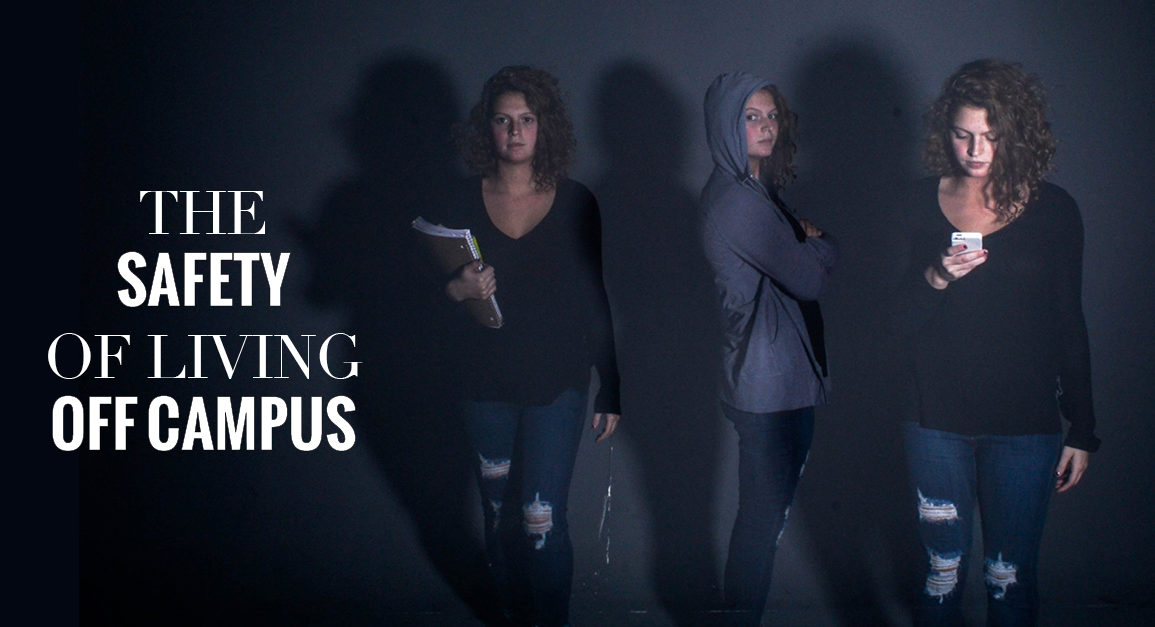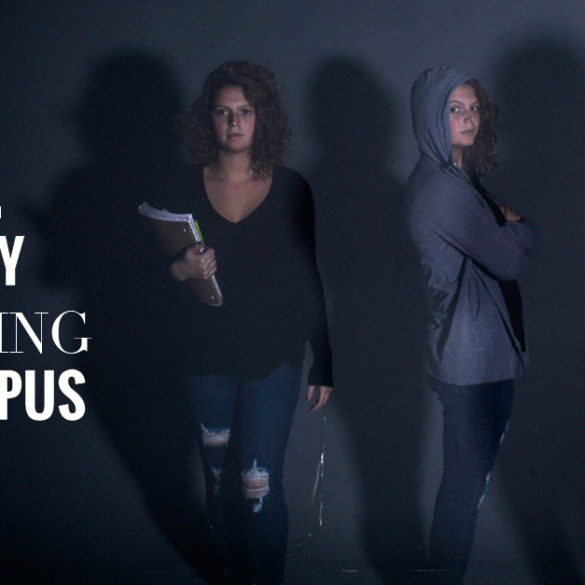The attempted break-in at one student’s house left her more conscious of the problems with off-campus living.
She couldn’t have been asleep for more than an hour when a quiet hymn played into her bedroom at 3 a.m., stirring her awake. It was a haunting melody someone might hear escape the depths of an old music box in his or her grandmother’s attic. Nicole Glenn, a sophomore elementary education major, couldn’t decide if she had really heard this as she looked around her dark room. But just as she was drifting back to sleep, it played again.
The 1950s tune came from the doorbell, an outdated ring to match a house that resembled the same time period. Immediately jumping up, she and another roommate ran from their rooms and met at the front door. Confused, they both waited for the bell to be pushed yet again, hoping that was all that would happen. Shaking and clutching her arms over her chest, Nicole said she had never been more scared. Reaching for the door handle, she jumped back as it suddenly started shaking with force on the other end. Both girls ran screaming to the nearest bedroom and called the police as the pounding of fists on their door got louder and louder. Their first Thursday back at school in their new house on a remote side of Beechwood changed just how safe they felt living off-campus.
According to Ball State’s section on the U.S. News and World Report, 59 percent of students live in off-campus housing. Many students enjoy the freedom of not living in the dorms. But when it’s 3 a.m. and there is someone banging on your door at your house on a secluded part of Beechwood, a resident assistant down the hall doesn’t sound so bad.
Packing her backpack before heading out for the day, Alex Tate, a junior special education major and Nicole’s roommate, found out that this attempted break-in was something she slept through the previous night. Whether or not the unwelcomed guest was an attempted burglary is unknown, but an incident like this is surprisingly less likely to happen off campus than it is on campus. According to the National Center for Victims of Crime’s website, of the burglaries to be reported for colleges in the Clery Act in 2010, 95 percent were on campus and only 5 percent off campus. However, according to that same report, 41 percent of robberies were on campus, while 59 percent were off. University Police Department’s Chief James Duckham said even this winter there were five burglaries off-campus, but this is a decrease from the previous year’s winter break.
This issue was not the first to create an unsafe feeling for Alex, Nicole, and their other roommates. “We’ve had so many problems with this house. Having someone try to break in was just one,” Alex said. She moved off-campus because she thought it would be cheaper, saying she did the research and found she would be saving about $4,000 to rent her 5 bedroom house from a rental company.
The house’s largest issue? Mold. Alex said that some of their bedrooms had mold growing in them, their closets having the worst of the fungus. Their landlord at the time, who has now been let go by BSU Cribs, told them to clean it out to the best of their ability.
They did, and yet the problem kept occurring. “It was so annoying. I was so mad. I had to throw out many of my own belongings for a problem the landlord should have fixed. It just shows how much they didn’t check before they let us move in,” Alex said.
Cleaning did not do much for the mold, as it continued to show up in different areas of their house, like the shower. Alex began to regret their choice of living as their house began to feel more and more unsafe. “One of our other roommates is allergic. Everyone began to feel really sick and uneasy,” she said.
Maricel Curtis, who has taken over the position of director of operations from the director that handled Alex’s situation, said this would now be handled completely differently than it was at the time. She said after the first complaint she would come out to the property, make sure to send off samples of the mold to be tested, have their maintenance team clean up the fungus, and use primer to kill anything that could be causing it. Her next step would be figure out essentially what is causing the mold. “Once we deem what the issue is, we can try to fix it. We don’t want anyone to get sick of course, that’s the main concern,” she said.
Of course the house had its little problems too, as do many of the rental properties surrounding Ball State. Maricel said the most common issue with properties around Muncie is plumbing and since this summer of heavy rain, basements flooding. To deal with this kind of damage, Maricel has a maintenance team and plumbers to fix the problem before tenants even arrive. Under past management, BSU Cribs seemed to miss this, among other things. The house was filthy when the girls moved in and light bulbs had to be replaced in most light fixtures. There was paint coming off in areas, there were lumps in the linoleum, and their washer didn’t work for the first three weeks of the first semester.
BSU Cribs now implements a move-in walk through, a move-out walk through and quarterly walk throughs, Maricel said, to ensure that there are no maintenance issues inside the housing.
The issues that really worried Alex were the ones that could potentially hurt her and her roommates such as the fire hazard of most of their electrical outlets not working. They called BSU Cribs, at the time still under the leading of the previous director, several times but got little action. Alex said the rental organization even refused to talk to any of the renters’ parents because the company considered the students to be adults.
Alex argues: “My father is my cosigner, I feel like he should be able to talk to them for me.”
Maricel said she welcomes parents to speak with her, but as director so far has found that she speaks with the tenants themselves more. “I think I talk more to tenants than parents, but you will always have that overbearing mother, which is to be expected. They just love their babies. The tenants are pretty good about relaying any issues to me that they’re having with me or their rental property in a professional and adult manner,” she said.
In many towns, including Muncie, rental properties are only inspected if a tenant complains. Eventually, Alex had no choice but to call a zoning and structural inspector who works for the City of Muncie’s office. The inspector came out and reported several violations. After that, Alex said action was finally taken and the rental company sent out maintenance men to fix aspects of the house deemed as violations by the inspector. However, their feelings of uncomfortability in the privacy of a place that should be considered their own home didn’t stop there. While BSU Cribs sending out a maintenance man was greatly appreciated, waking up to a random man in their house was a bit off-putting.
“There were days where he would be there before I would wake up,” Alex said. “He was very nice, but it was just weird. I felt like I couldn’t shower and get ready for my day.” For two weeks there were two men working around their house from 8 a.m. to 5 p.m.
“This house I am in now doesn’t feel like home. I don’t feel safe even after things have been fixed. The landlord should have made a better effort to make us all feel safe in this home. Things have definitely improved though, ” Alex said.
The problems that occurred for roommates Alex and Nicole are ones to which many students in off-campus housing can relate, whether it is the house itself, the landlord or just the vulnerability of living in an unfamiliar area. But, these are not issues limited to a university setting. It’s life, Maricel argues. “You need that transition from the dorms and to the real world without that smack in the face. Things come up in off-campus housing that would never occur in a dorm. Even your Mom and Dad have people knocking on the door in the middle of the night. Turn the lights on; whatever you do don’t answer the door and call the police immediately.” she said. Chief of Police at Ball State, James Duckham, gave similar advice for student safety, whether off-campus or on. “Lock all doors and windows, even if you will be gone only a few minutes. Leave lights on when you are not home. Don’t post comings and goings on social media,” he said.
With so many students living off-campus on their own for the first time, there are going to be complications. Issues with these older homes can lead to frustrations with landlords. But this segway into adulthood for for students allows for experience in issues that will occur off-campus and in the real world.




